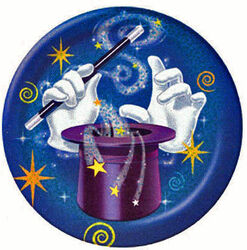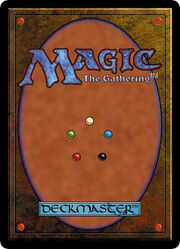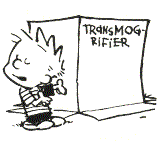
Hocus pocus alakazam!
Magic is a catch-all name for various powers, abilities, attributes and phenomena, etc. etc., present in fictional continua and not usually considered present in the Real World. The origins and uses of magic vary wildly from world to world. Magic is generally considered separate from psychic powers, but not always.
Appropriate mystical abilities vary widely by continuum and even within some continua. Many continua do not allow for the existence of magic at all. Magical abilities often go by specific names (e.g the Force in the Star Wars continuum, the Gift/Wild Magic in Tamora Pierce's Tortall books) and almost always have a set of rules or laws for their use. Some magic is inherent and some must be learned. There may be a price for completing a spell/ritual or the user may require specific ingredients or a verbal or physical cue to activate it. In any case, when continuum rules of magic are broken, this constitutes a charge.
There is a 'spectrum' of how accepting these continuum rules are, with ends in 'soft' and 'hard' magic.
'Soft' Magic[]

Hey, look what I can d... wait, what?
It is hard to say how 'soft' magic works. It works because it does. This is a classic depiction of magic in many cases: the fairy godmother waves her wand, and suddenly a pumpkin is a coach. The absolute softest possible magic would be extremely random and difficult to control, creating a kind of chaos where anything could happen under any circumstances. But most continua have at least a few rules.
For example, The Lord of the Rings is a series with soft magic – when Gandalf makes use of magic, the only rule is that he is Gandalf and he is allowed to do stuff like that. Narnia canon follows a similar idea, and very slightly closer to the middle is Xanth, in which each object has its own set of rules, but the whole does not follow a discernible order of any kind.
Usually, the few rules in soft settings are very definite. Gandalf and some elves can use magic, but a random girl off the street cannot. (To be more precise, Gandalf is capable of using magic because he is an Istar – fully explaining the intricacies of this is a matter best left for a page devoted to Lord of the Rings, so it should suffice to say here that Gandalf is effectively a demi-deity. Magic is not something that can be performed by mere mortals.) Aslan may make things happen and other powerful beings may also have a hand, but the majority of other denizens of Narnia cannot. In Xanth, the magic effects of an object or animal have something to do with a pun concerning it.
If any of these very strong, loose rules are broken, it is a really big charge.
'Hard' Magic[]

This Magic has a lot of rules, and when you fudge them the other guy gets pretty mad.
Hard magic is detailed, strict, and precise. The more rules magic uses, the 'harder' it gets. The application of the very hard magic is extremely limited – and the hardest magic possible is... the Real World, which has no magic. Like 'hard' science-fiction, hard magic uses realism, and the more realistic the setting gets, the less magic or the less power it has. For example, a hard magic fireball follows the same rules and physics as a normal fire, whereas a soft magic fireball may ignore them. In hard magic, magic is usually depicted as a force in the same way gravity is.
Harry Potter's magic is decently hard. Witches and Wizards can use magic, but only pre-made spells developed under experimentation and research, and with the use of a wand. In Dungeons & Dragons-related material, each character class follows their very specific rules for magic (drawing power from a deity, using arcane spell components, calling on the laws of nature, etc.) and does not deviate. In LeGuin's Earthsea canon, magic may only be cast using a true name in the Old Speech, the tongue of dragons.
Ignoring one or two of the smaller rules, or making up rules for specifics may be okay in a hard magic continua if it makes sense with the other rules. But if an author makes up rules wantonly, or ignores major ones, it becomes grounds for a charge. A witch cannot wave her hands and conjure lightning bolts without a word. A Druid cannot cast Cleric spells. You cannot move an apple on Havnor by uttering 'banana bo bana flu flanna maranna'.
Science and Magic[]
- Any sufficiently advanced technology is indistinguishable from magic.
- —Arthur C. Clarke
- Any sufficiently rigorously-defined magic is indistinguishable from technology.
- —Larry Niven
Magic, when described in specific enough terms, can be deemed a kind of technology as long as it is orderly enough to have rules. A magic computer should perform as a technological one. A magic broom is essentially a motorcycle, if the magic that makes it fly is as comprehensive as the workings of an automotive. Certain 'hard' magic can become a 'soft' science fiction.

Like so.
Similarly, if a very technologically advanced device is so complex as to only be able to be described as 'the thing that goes ding when there's stuff', it becomes a sort of magic to the viewer. We have no idea how it works, only that it does.
This sometimes can be a charge if the technology is not sufficiently advanced to merit a magical quality, or the magic is not defined enough to be a science or technology.
The PPC's sufficiently advanced technology is indeed sometimes indistinguishable from magic.
